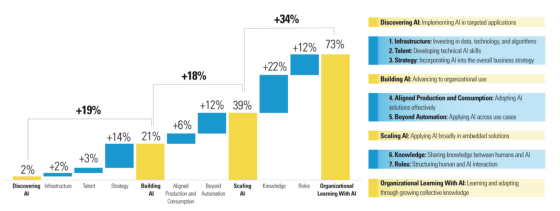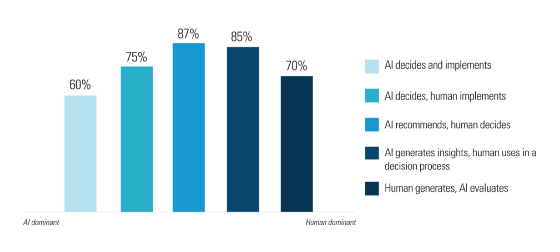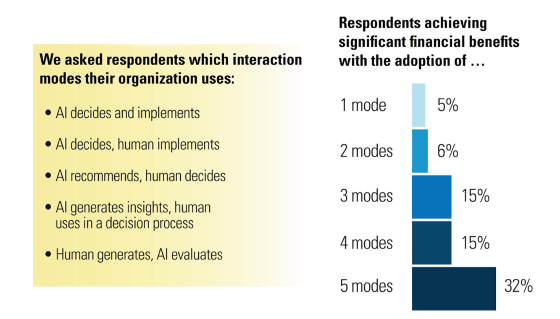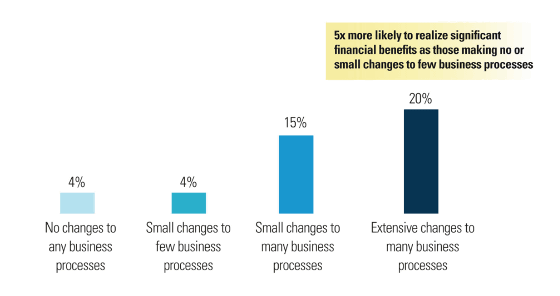Survey results show that it is meaningless to just use AI, and that 'organizations must learn' in order to generate profits from AI

Expanding AI's Impact With Organizational Learning
https://sloanreview.mit.edu/projects/expanding-ais-impact-with-organizational-learning/

A research team, including Sam Ransbotham of Boston University, conducted a survey of 3,000 corporate leaders around the world, and at the same time interviewed corporate executives and researchers, who benefited significantly from artificial intelligence technology. It turns out that only 10% of all companies have AI adoption.
Fifty-seven percent of the companies surveyed said they were piloting or deploying AI in-house, 59% had an AI strategy, and 70% understood how AI could create value for their business. These numbers have grown over the last four years, but it's worth noting in this survey that one in ten companies is still making significant economic gains from AI.
By analyzing the findings, researchers have revealed what companies need to generate economic benefits with AI. In short, organizations that 'learn' how AI shows how to increase their economic benefits are more likely to make them.
The 'organization that learns from AI' has the following three characteristics.
・ Promotes systematic and continuous learning between humans and machines
・ Developing multiple ways for humans and machines to interact
・ Change to learn and learn to change
Researchers who analyzed the responses of business owners said, 'In order to realize economic benefits with AI, we need more than the basics of data, infrastructure, and human resources, and incorporating AI into our business is not enough.' However, he said, 'The returns from investing in AI are more than they appear in immediate financial results.'

The benefits of AI are not goals, but 'learning.' The survey showed that companies that benefit financially from AI are deliberately trying to become 'learners using AI.'
For example, German car maker Porsche uses AI to determine production in a particular region. Demand is constantly changing in the market and regulations vary from region to region, so manufacturers must constantly understand their needs, make continuous forecasts and adjust manufacturing. For this reason, Porsche CIO Mattias Ulbrich says, 'We are continuously learning the optimal configuration from the millions of options we offer to each market based on AI.'
However, sensing changing needs is not enough, and in many cases 'speed' is important. Baidu, a Chinese search engine operator, has made AI an early strategic imperative, and Baidu Research's Yanjun Ma said, 'This has had a direct impact on our efficiency, speed and accuracy.' Was stated.
However, it is not easy to continue learning with AI. Based on the survey responses, researchers have classified the activities that influence the economic benefits of AI into the following seven categories. By doing all seven, the odds of getting a big financial benefit will increase by 73%.
◆ Find AI
◆ Build AI
1. 1. Infrastructure: Invest in data, technology and algorithms
2. Human resources: Develop AI skills
3. 3. Strategy: Integrate AI into your business strategy
◆ Expand AI
Four. Coordinate manufacturing and consumption: Apply AI solutions efficiently
Five. More than automation: Applying AI to use cases
◆ Systematic learning with AI
6. Knowledge: Sharing knowledge with AI and humans
7. 7. Roleization : Build human-AI interactions
The figure below shows how the probability increases by executing the seven activities one by one.

In particular, the key is that AI and humans learn from each other. Specifically, 'humans learn from AI, AI learns from human feedback, and humans learn autonomously.' It corresponds to the effort of 'designing AI to do'.
Human business owners think of ways to get the best results for their business, but sometimes AI suggests alternatives from unexpected directions. For example, at
And from the survey, the cooperation between humans and AI in companies is 'AI decides and implements' 'AI decides and humans implement' 'AI recommends and humans make decisions' 'AI makes decisions' We know that there are five forms: 'discovery and humans use that knowledge for decisions' and 'AI evaluates what humans create.' The most common method is 'AI recommends and humans decide', which is shown in the third graph from the left.

In addition, companies that can carry out multiple collaboration methods on a daily basis within the organization will be more likely to obtain financial benefits.
And it is important not only to take multiple cooperation methods, but also to be able to change the method as needed. In the pandemic of Severe Acute Respiratory Syndrome (COVID-19), society has undergone a sudden and dramatic transformation, increasing the need for new algorithms to monitor human behavior in online shops. According to Prakhar Mehrotra, head of machine learning at Wal-Mart, the newly introduced algorithms in the pandemic initially required a lot of human hands, but by accumulating data, AI systems learn. However, it is said that appropriate recommendations have become possible.
Even with a well-designed system, the demands will change as circumstances change. For this reason, management needs to be prepared to change depending on the situation. Researchers say that it is important for organizational learning using AI to use as many of the five collaboration methods as possible, to use appropriate collaboration methods depending on the situation, and to switch the collaboration methods quickly. ..
However, even if there is an interaction between humans and AI, there is no benefit if we ultimately reject the changes proposed by AI.
Learning with AI can sometimes be accompanied by unpleasant changes. 'Algorithms don't know about organizational diagrams,
It is difficult to change business processes based on AI proposals. However, in this study, companies that 'haven't changed their business processes at all' have a 4% chance of making an economic profit, while companies that 'have made major changes to their business processes' are five times more likely. The results show that companies that are aware of the risks but have implemented AI reforms are more likely to get greater returns, with results increasing to 20%.

Related Posts:
in Note, Posted by darkhorse_log







